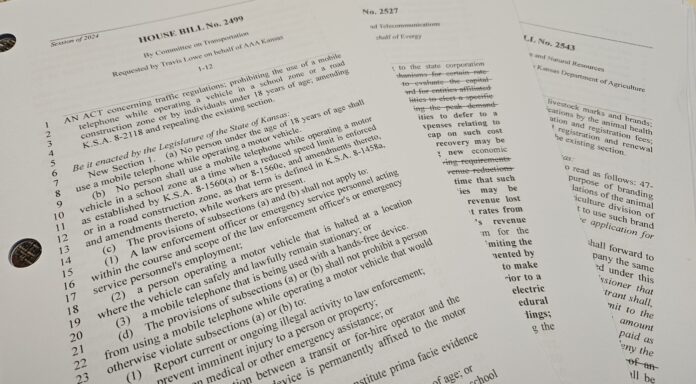Gov. Laura Kelly on Wednesday signed legislation that will make it easier for prosecutors to make a case against anyone who encourages someone to commit suicide.
The bill, passed 107-12 in the House and 32-4 in the Senate makes it explicitly illegal to knowingly encourage another person to commit or attempt to commit suicide.
The bill was born out of couple of cases, including one from Wichita where a 21-year-old man died by suicide after two people who knew him sent him text messages encouraging him to take his own life.
There was another case from Johnson County where a 23-year-old Lenexa man died by suicide after turning to a website with instructions on how to take his life.
The Legislature took action after hearing impassioned pleas from parents who lost children to suicide, either because they were encouraged or because they visited websites that showed them how to take their lives.
“It is imperative that we do whatever we can to protect vulnerable people while they are struggling, and in their darkest moments,” said Kelli Wilson, whose 18-year-old son died by suicide in 2020 after visiting a website showing how he could take his life.
“It is no secret that the way people communicate has drastically changed over the years,” she said. “The common denominator here is that the people that are encouraging suicide,
sharing methods and method sources, are online and anonymous.
“Time and time again, I have had to use the media to bring awareness to this, and I’m not sure why something so sinister is still actively occurring.”
One of the more high profile examples that Kansas is trying to address was a Massachusetts case where a teen girl was found guilty of involuntary manslaughter as a youthful offender in connection with her boyfriend’s suicide.
In a series of text messages with her boyfriend, the girl encouraged her boyfriend to kill himself and told him when and how he should kill himself.
During the debate over the bill, concerns were raised about what implications the bill might have for free speech rights.
There are 12 states that have laws on the books that address assisting suicide, according to the Board of Indigent Defense Services.
The board found two instances – in California and Minnesota – where similar types of laws were challenged.
In 1992, the California Court of Appeals found that the law did not violate the First Amendment. Critical in that case, the California Supreme Court interpreted the statute to
require direct conduct such as furnishing a weapon or other means to commit suicide.
In 2014, the Minnesota Supreme Court ruled that a law that prohibited “encouraging” or “advising” suicide violated free-speech rights.
The girl in the Massachusetts case asked the U.S. Supreme Court to review her conviction, claiming that it violated her First Amendment rights. The court didn’t hear the case.
Kansas recorded 591 suicide deaths in 2022, a 6.5% increase from 555 in 2022, according to a report compiled by the state health department.
The suicide age-adjusted death rate increased from 19.2 deaths per 100,000 population
in 2021 to 20.3 deaths in 2022.
Even though the single-year change in rate was not statistically significant, the suicide rate in 2022 was the highest in the last 20 years, the report said.
About 82% of suicide victims were male. The three age groups with the largest number of suicides were: 25-34 (123 deaths), 35-44 (114 deaths) and 15-24 (98 deaths).
The most common methods of suicide were firearms (347 deaths), suffocation (142 deaths) and poisoning (69 deaths).
In other bills signed Wednesday:
House Bill 2501: The bill requires railroads in Kansas to store train cars a minimum of 250 feet away from railroad crossings in an effort to enhance railway safety and reducing blocked crossings. The bill passed unanimously in the Senate and 120-1 in the House. As it originally passed in the Senate, the bill would have barred railroads from operating trains exceeding 8,500 feet in length. Republican state Rep. Shannon Francis, chair of the House transportation committee, said he believed that federal law preempted the state’s ability to regulate train lengths. “I’m not too interested in passing legislation just so we can wind up in federal court,” Francis said in an interview.
Senate Bill 410: Provides changes to the SALT Parity Act so business owners won’t be double taxed for income when electing to use a pass-through entity.
It also provides property tax exemptions for certain new electric generation facilities and certain additions to electric generation facilities. For instance, the bill would exempt any new electric generation facility, including nuclear energy plants, for which construction begins on or after Jan 1, 2025, as well as any new addition to an electric generation facility constructed or installed on or after Jan. 1, 2025. Also exempted is any new pollution-control device constructed or installed at an electric generation facility on or after Jan. 1, 2025. Evergy, Kansas Electric Cooperatives and Midwest Energy testified for the bill. They said that estimated electrical power demand is greater than the estimated supply in future years, and that Kansas needs more independent power producers to install and operate peak load generation plants. They said the bill would remove a disadvantage those facilities have in comparison with electric generation facilities owned by public utilities.
The bill also clarifies that land used for agritourism is agricultural land for property tax purposes. Starting in tax year 2021, any land designated for agricultural use would include land and buildings used as part of a registered agritourism activity at a registered agritourism location by a registered agritourism operator. The sale of merchandise associated with the registered agritourism activity by the agritourism operator would not change the classification of the land or buildings as a result of those sales.
The bill also replaces the 15% penalty for employers not paying withholding
taxes to the state in a timely manner with a graduated penalty system. The penalties would be 2%, if the payment is one to five days late; 5% if it’s six to 15 days late; 10% if the payment is more than 15 days late; and 15% if the payment is more than 15 days late and the Department of Revenue notified the taxpayer regarding the delinquency.
The bill passed unanimously in the House and 34-2 in the Senate.
Senate Bill 438. The governor signed a bill establishing the Kansas Blueprint for Literacy and a Literacy Advisory Committee and directing the Kansas Board of Regents to appoint a director of literacy education.
“The Kansas Blueprint for Literacy is an innovative piece of legislation that will transform how we prepare educators to teach reading and better equip our students with the literacy tools they need to succeed,” Kelly said in statement.
“This bill places Kansas at the forefront of nationwide efforts to reform reading instruction and expands on the progress we have been making to prioritize literacy throughout a child’s academic journey.”
The bill passed 98-22 in the House and 34-3 in the Senate.
Supporters said the Kansas Blueprint for Literacy will redesign the teaching of reading to focus on evidence-based research including phonemic awareness, phonetics, fluency, vocabulary and comprehension.
They said the bill prioritizes a comprehensive approach to retrain Kansas educators in the science of reading, structured literacy, and literacy screening and assessment tools.
“For many years, the Kansas Legislature has recognized the solid science behind early literacy success for children,” said state Sen. Molly Baumgardner, chair of the Senate Education Committee.
“It requires early screening of children, solid teacher training in the science of reading, and classroom materials that support evidence-based practices,” Baumgardner said.
“I’m proud that the Blueprint for Reading is a collaborative effort that establishes a clear pathway for our current and future educators to be appropriately trained to teach Kansas students to read,” she said in a statement.
“It also creates the essential framework for an innovative and inclusive approach to assure accountability between higher education institutions, education advocates, school districts and parents.”
Senate Bill 333: The governor signed a bill creating an employment preference for persons with disabilities for state employment so long as they meet the qualifications of the position. For the purposes of the bill, “state government” would not include the judicial or legislative branches nor political subdivisions of the state. The bill passed 36-1 in the Senate and unanimously in the House.
Substitute for House Bill 2570: Updates employment security law to ensure the integrity of the unemployment insurance system and balance employer contributions with their use of the system. The bill also extends certain statutory provisions necessary to complete the modernization of Kansas’ unemployment insurance software. Among other things, the bill modifies rate contributions for new employers and provides for an annual write-off of a portion of negative unemployment compensation account balances for certain employers. The bill passed unanimously in the House and 38-1 in the Senate.
House Bill 2760: Renames the Kansas Commission on Veterans Affairs Office to the Kansas Office of Veterans Services and updates statute to reflect that name change and transfer all duties and authority to the newly named office. The bill also amends grant requirements for the Veterans Claims Assistance Program to require applicants to have a presence at the federal VA regional office or medical center in Wichita in order to be eligible for a grant. The bill passed unanimously in both chambers.
















